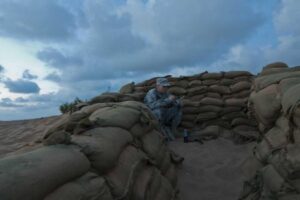Army’s New Sandwich Fights Decay, Stays Fresh for Two Years

The US Army has developed a new sandwich that can be stored for two years without refrigeration, freeze drying or adding water.
The new pocket sandwiches are tough competition for the vacuum-packed Meals Ready to Eat (MREs) that troops are used to on the battlefield. MREs are designed to be light and portable, have a long shelf life and be able to deliver lots of energy to hungry troops. The just-add-water meals leave something to be desired in terms of texture and digestibility, and are particularly hard to carry and prepare in intense combat environments like Iraq and Afghanistan. Soldiers would remove all the excess packaging on MREs to lighten their load, but stripping the wrappers often made the food inedible.
The Army developed the First Strike Ration as a “compact, eat-on-the-move assault ration” that seals 24 hours of food in a package that’s lighter than the equivalent in MREs. The shelf-stable sandwiches are a welcome addition to rationed meals that must survive being dropped from a helicopter and stored for long periods before being consumed.
Michelle Richardson, Senior Food Technologist working on the Combat Feeding Directive, explained some of the preservation science behind the stay-fresh sandwich on BBC’s “Afterlife: The Strange Science of Decay.”
In extending the shelf life of battlefield cuisine, the trick is to control pH, water activity, moisture and oxygen. The pocket sandwich’s best allies are humectants, ingredients like honey, sugar and salt that trap water from fruits and vegetables and prevent sogginess. Humectants are an ingredient, but the packaging plays an important role too. “Oxygen scavengers,” packets of iron shavings included in the sandwich bags, trap moisture and oxygen in a layer of rust to prevent any chemical reactions that require oxygen. This presents a big hurdle for bacteria growth.
Richardson’s Army Laboratory has set its sights on pizza cheese, an ingredient that needs moisture to be edible. The lab continues to work on new ways to keep yeast, mold and bacteria on the retreat so that soldiers can enjoy a more palatable menu.
image: US Army Africa
Keep in touch with Erin on Twitter: @ErinPie

